Water damage is one of the most costly problems a homeowner can face. Did you know that 98% of homes with basements experience some water damage at least once?
Is your home safe from water damage?
Basement waterproofing prevents structural damage, mold growth, and expensive repairs. Basement moisture control can protect your home’s integrity, improve indoor air quality, and increase property value.
This guide will discuss the causes of leaky basements, waterproofing methods, and maintenance tips. Read on to learn how to keep your home safe and dry.
What is Basement Waterproofing?
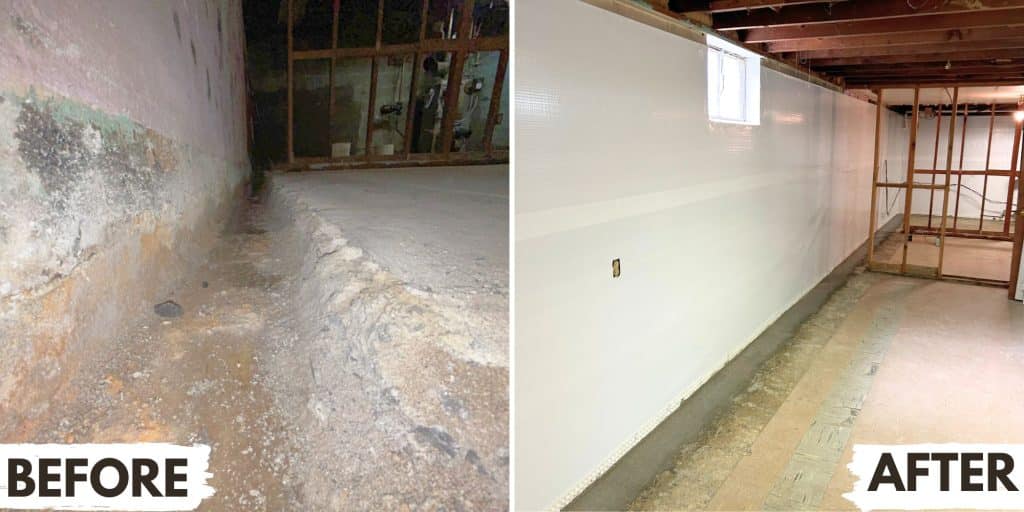
Water damage is a homeowner’s worst nightmare. A wet basement due to poor waterproofing is a common issue that can cause major problems. That’s where basement waterproofing helps.
Basement waterproofing is a crucial process to prevent moisture from entering your basement, which can lead to structural damage, mold growth, and costly repairs. This process involves finding where the water is coming from, repairing any existing damage, and applying methods to prevent future leaks. These methods range from interior solutions like drainage systems and sump pumps to exterior approaches such as waterproof coatings and landscape adjustments.
Why Waterproof Your Basement?
Spending money on moisture control might seem unnecessary, but it can save you a lot on repairs. The Insurance Information Institute says water damage is a common reason for property damage claims in the US. Rain and freezing temperatures often cause this damage.
In Virginia, basement water damage is a significant concern. The Insurance Information Institute found that 1 in 60 homes filed a claim each year from 2016 to 2020, and the average cost of each claim was $11,650.
These figures highlight the importance of having a basement waterproofing system for Virginia homeowners, ensuring home safety and saving on costly repairs.
Beyond repairs, it can also:
- It prevents water damage to the foundation and basement floors and walls, keeping the home strong and stable.
- Improves indoor air quality by stopping mold and mildew growth.
- Increase the value of your home, making it more attractive to potential buyers when you decide to sell.
- Make your home a healthier place to be by reducing the risk of water-related dangers and health problems.
- Save on energy bills
- Turn your finished space into a dry area for storage or living.
Thus, waterproofing your basement ensures peace of mind, knowing your home is safe and dry during heavy rainfall.
Signs You Need to Waterproof Your Basement
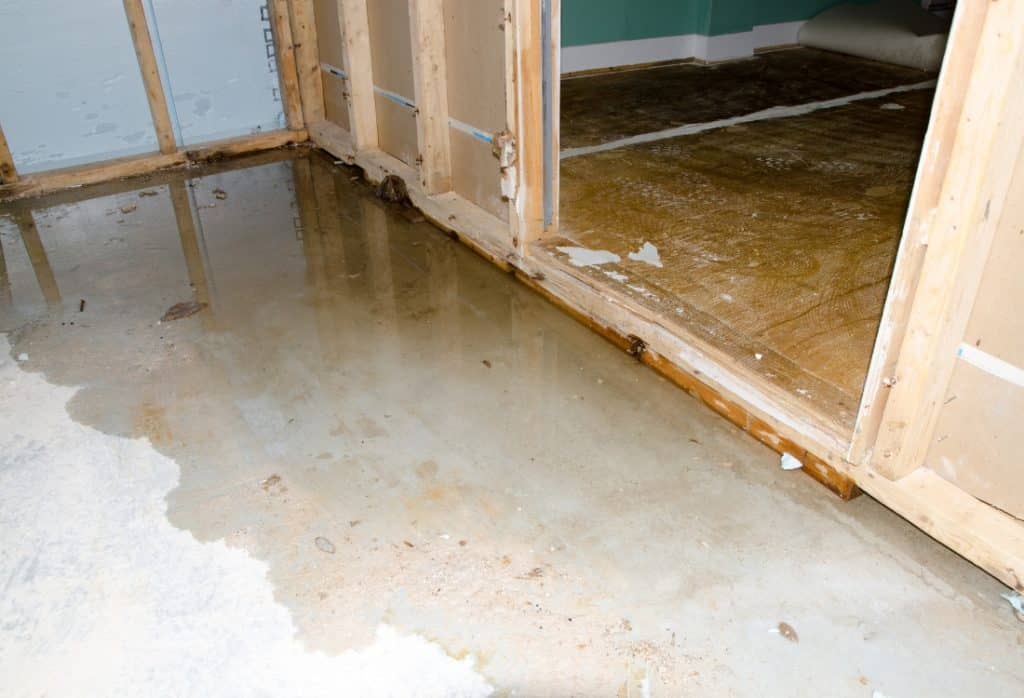
If your basement is showing any of these signs of water problems, it’s time to call a professional:
Inside Your Home:
- Dust mites
- Damp and musty carpets
- Buckling hardwood floors
- Condensation in your attic
In Your Basement:
- Water stains or discoloration on the floor and walls
- Musty smells
- Standing water on the floor or a flooded basement
- Cracks in the basement wall, floor, or foundation
- Bowed basement walls
- Wood rotting
- mold and mildew growth
- Peeling paint or wallpaper
- Efflorescence (white, chalky walls)
- Condensation on pipes
- Leaky basement walls
It’s important to recognize the signs that your home needs waterproofing early. If you see any of these signs, it’s time to talk to a professional about waterproofing your home.
What Can Cause Water Dampness in Your Basement?
Basements often get damp due to a few common reasons. Knowing what these are can help you fix the problem. Here are the main causes of water damage:
- Poor Grading
- Hydrostatic Pressure
- Foundation Cracks
- Plumbing Leaks
- Damaged or Clogged Gutters and Downspouts
- Sump Pump Failure
- Soil Settlement
- High Water Table
Knowing these causes can help you do something to keep your basement dry and your home safe from water damage. Different waterproofing methods can fix these problems effectively.
Types of Basement Waterproofing Methods
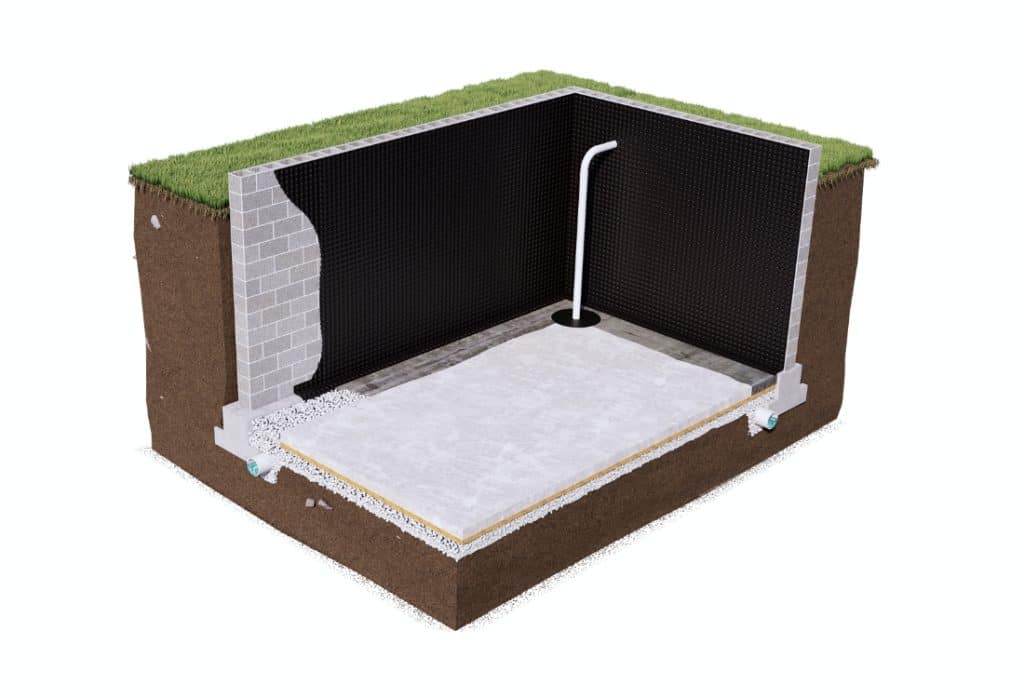
There are different ways to waterproof your basement, depending on the problem. A professional can help you choose the best solution for your home.
Let’s take a closer look at some of the most popular and effective solutions:
Interior Basement Waterproofing
Interior basement waterproofing method involves installing drainage systems inside basement walls to catch and redirect groundwater away from the house. The interior waterproofing system comprises a drainage channel, a sump pump, and perforated pipes. It’s an effective, low-cost way to fix moisture damage in homes while keeping the outside homes looking good.
Exterior Basement Waterproofing
Exterior basement waterproofing method effectively prevents wall leakage and provides a long-term solution to moisture problems. Exterior waterproofing involves excavating the perimeter of the foundation and applying a waterproof coating or waterproofing membrane to the exterior walls. It also includes installing an exterior drainage system around the foundation to redirect water away, offering comprehensive protection against water intrusion.
Landscape French Drains
Landscape French drains can help keep the yard dry and prevent moisture damage. They are a great choice for homeowners looking for an affordable and low-maintenance solution. Installing a landscape French drain involves digging a trench, filling it with gravel, and various drainage piping.
When it rains, the drain collects excess water and directs it away from the yard. This helps prevent moisture from reaching the foundation.
Downspout Extensions
Downspout extensions are effective drainage solutions that direct rainwater away from your house’s foundation. They involve putting pipes or channels underground to move water away from the foundation, preventing moisture from entering.
Basement Crack Repair
Fixing cracks in the basement concrete floor or wall involves filling them with epoxy resin or expanding foam to stop water from getting in. Then, the cracks are sealed with hydraulic cement or another material to stop moisture from leaking in. Basement crack repair is a reliable solution that ensures a dry living space by addressing specific problem areas.
Basement Sump Pump System Installation
A sump pump is a device that pushes water out of a hole called a sump pit in your basement. It sits under the basement floor at the lowest spot and pushes out any water that enters the pit.
If your basement floods frequently, putting in a sump pump is a good investment. It will help you feel peaceful and keep the water under control.
Basement Wall Vapor Barrier Installation
Installing a vapor barrier for basement walls effectively prevents moisture from entering. It works like a shield, keeping out condensation and dampness and lowering the chances of mold and damage to the structure. This is especially beneficial in humid climates or areas with heavy rainfall.
There are several waterproofing solutions, but the best option for your home depends on the specific problem. Learn more about these methods and their applications in “ The Ultimate Guide to Basement Waterproofing Methods.”
Factors Influencing The Basement Waterproofing Costs
Several factors determine the cost of basement waterproofing:
- Extent of Damage
- Method Chosen
- Size of Basement
- Location
- Type and Quality of Waterproofing Products
Budgeting Tips and Financing Options
- Get multiple quotes
- Consider financing to manage your budget.
- Plan for maintenance
- Choose high-quality waterproofing materials.
How to Hire a Professional Basement Waterproofing Contractor
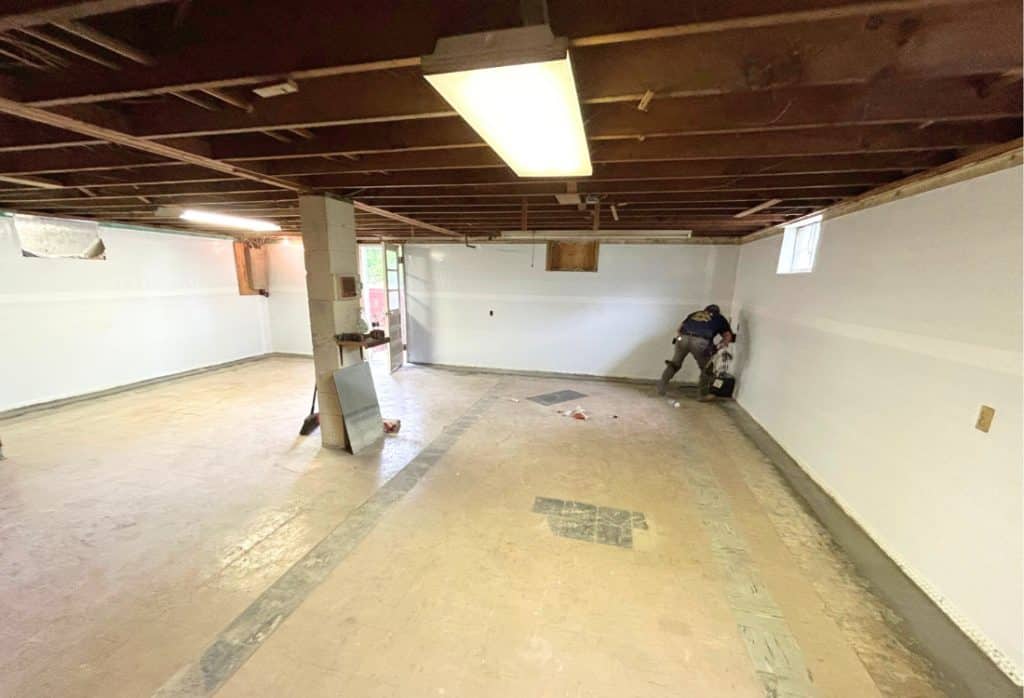
Choosing a basement waterproofing expert is crucial for safeguarding your basement from water damage. When hiring a professional for basement waterproofing:
- Verify Credentials: Ensure the basement specialists are licensed and insured.
- Check Experience: Look for basement repair companies with extensive waterproofing experience, like the LUX Foundation Solutions.
- Do thorough research: Ask friends, family, or neighbors for recommendations and read online waterproofing reviews.
What to Expect During the Process
A professional waterproofing process typically involves:
- Initial Assessment
- Solution Proposal
- Implementation
- Follow-Up
Different waterproofing methods exist, but hiring expert basement waterproofing specialists for your waterproofing project has many benefits for long-lasting results.
Basement Waterproofing Maintenance Tips
A finished living space is great for storing old items or creating a cozy home theater. But if it gets damp, it can lead to water damage and other issues.
Here are some easy tips to help you keep your basement healthy and avoid future water damage issues:
- Keep gutters clear and clean of debris, and extend your downspouts so water can flow away from your foundation.
- Check often for signs of water damage, such as mold, musty smells, and watermarks, to prevent small problems from worsening.
- Fix any cracks or moisture seepage in the foundation walls or floors as soon as you spot them.
- Install a basement dehumidifier to control humidity levels and prevent mold growth. Keeping humidity below 60% prevents mold growth and keeps indoor air quality fresh.
- Avoid storing items and use plastic containers instead of cardboard boxes.
- Ensure your home has good ventilation, either through windows or a dehumidifier.
- Get a battery backup for your sump pump for power outages.
- Ensure the soil around your home slopes away from the foundation. This simple landscaping adjustment helps direct water away from the house foundation.
- Inspect your basement plumbing for leaks.
To learn more ways to care for your basement, check out our guide on “Basement Waterproofing Maintenance Tips.” It has deeper details and ideas on how to keep your basement healthy year-round.
Common Mistakes to Avoid
Avoid these pitfalls to keep your basement dry:
- Ignoring Small Cracks: Even minor cracks can lead to significant water problems.
- Neglecting Maintenance: Failing to maintain gutters and downspouts and upgrading old basement drainage systems.
- Using Temporary Fixes: Relying on short-term solutions that don’t address the root cause.
Basement Waterproofing Reviews from a Satisfied Client
Here is a review from a satisfied customer about his successful basement waterproofing project with LUX Foundation Solutions.
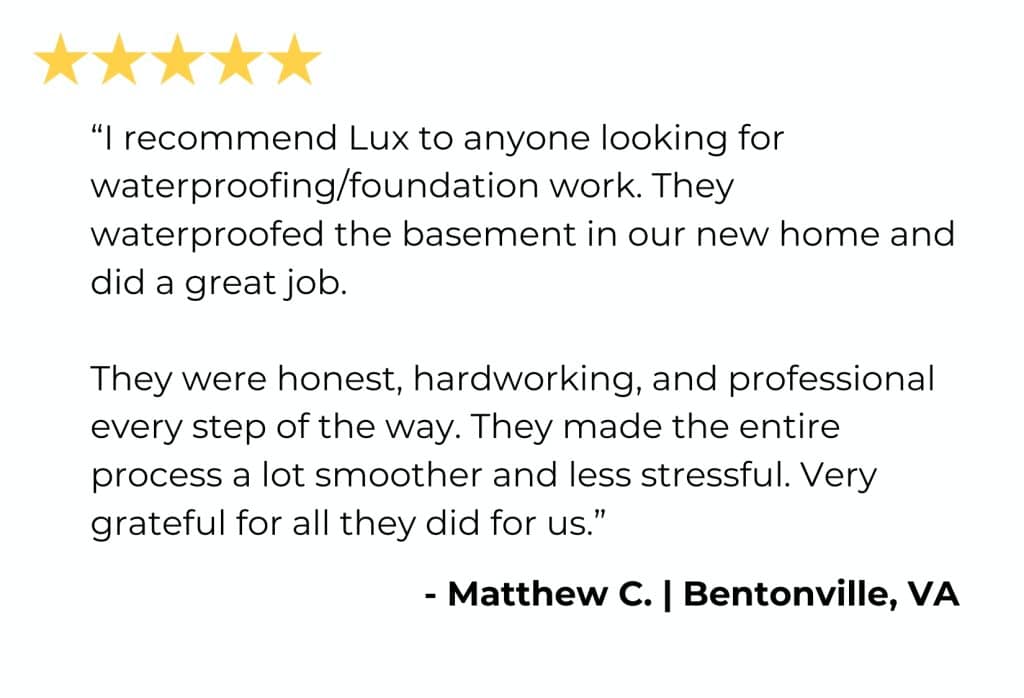
The Challenge
Matthew faced a significant challenge with water seepage in the basement of their new home. This issue threatened the foundation’s integrity and could have led to more severe structural problems if not addressed promptly.
The Solution
The LUX team provided a comprehensive waterproofing solution. Our team executed a thorough plan that included the following steps:
- Interior Drainage System: The team installed a high-efficiency interior drainage system along the perimeter of the basement floor. This system was designed to capture any water entering the basement and direct it away from the foundation.
- Sump Pump Installation: A reliable sump pump was installed in a strategically placed sump basin. This pump effectively removed the water collected by the drainage system, discharging it safely away from the home.
- Sealing Cracks and Joints: All visible cracks and joints in the basement walls and floors were sealed with a durable, waterproof sealant to prevent water ingress.
- Vapor Barrier Application: A vapor barrier was applied to the walls to protect the basement further. This barrier prevented moisture from seeping through the walls, maintaining a dry interior environment.
The Outcome
As a result of these targeted interior waterproofing measures, Matthew’s home basement remained dry and secure. The effective moisture control solution prevented potential structural damage and provided his family with peace of mind, enhancing the overall safety and stability of the home.
Read more client reviews and success stories to discover how Lux Foundation Solutions has helped homeowners like you achieve dry, secure basements and peace of mind
Get Your Basement Waterproofed Today
Ensuring your basement is waterproof is important to keeping your home safe from water damage and flooding. To ensure it stays dry, you need to know why leaks happen, find what might cause problems, and choose the best way to fix them.
Don’t wait for water damage to ruin your home. Contact us now for a free estimate on basement waterproofing. Fill out the online form or call us at 540-508-8587. Our experienced team is committed to providing effective and expert basement waterproofing services in Northern Virginia, Shenandoah Valley, North Central Virginia, and West Virginia.
Commonly Asked Questions
Is waterproofing a basement worth it?
Yes, waterproofing a basement is worth it for several important reasons:
– Protects Structural Integrity
– Prevents Mold and Mildew
– Increases Home Value
– Creates Usable Space
– Saves Money on Repairs
– Improves Energy Efficiency
– Peace of Mind
How much does basement waterproofing cost?
Basement waterproofing costs vary depending on factors like the extent of damage and the solution chosen. A professional contractor like our team at LUX Foundation Solutions can provide a quote based on your specific needs. Contact us for a personalized free estimate.
How much time does it take to waterproof a basement?
The duration varies based on how much damage there is and the type of solution we’re installing. A small repair can take as little as a day, a midsize repair a few days, and a larger repair a couple of weeks.
Does waterproofing my basement add value to my house?
Waterproofing can increase your home’s value by protecting it from floods and moisture damage. It also stops mold from growing, prevents damage to the foundation, and keeps the structure strong. Interior and exterior waterproofing solutions can also make a space more functional for storage or finished living space.
Also, having waterproofed basement walls and storage space can make your house more appealing to buyers if you decide to sell it later on.
How do you know if your basement needs waterproofing?
Signs include dampness, musty odors, moisture stains, water infiltration, mold growth, and visible cracks in the walls or floors.
If you see any of these signs, getting an expert to look at your basement is best. The LUX expert team can provide a free estimate and expert advice on fixing the issue and keeping your home dry.
Can I waterproof my basement myself?
DIY and using basement waterproofing products like waterproof paint or quick fixes might seem cheaper at first, but they can cost more in the long run. Hiring a professional contractor is better because they know what they’re doing. They can identify the source of the problem and suggest the best way to fix it.
Can you waterproof your basement from the inside?
Yes, our interior basement waterproofing solutions can waterproof your basement from the inside. Here are our methods:
Interior Sealants
Interior Drainage Systems
Sump Pumps Installation
Seal Crack Injections
Installing Dehumidifiers
Spread the word and keep basements dry! Share this guide with your family, friends, and neighbors to help them keep their basements dry and healthy. Click the icons below to share on your social media!
